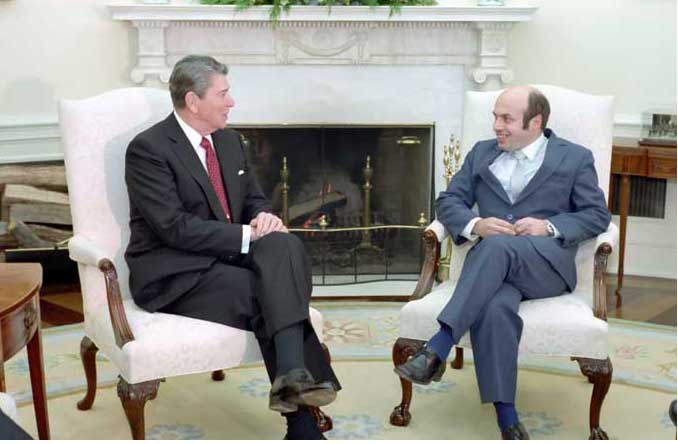1986 Scharansky Freed

Kavalla in Maceonia
On February 11, 1986 the Soviet released Anotoly Scharansky, a leading Jewish dissedent. Scharansky was being held in Soviet jails, accused of espionage. The release, which took place on February 11th, marked another event in the easing of East- West tension that had begun with Gorbachev's assumption of leadership. The release of Scharansky was soon followed by the granting of permission to emigrate for most of the leading Soviet Jewish "refuseniks" (those refused permission to emigrate).
Anatoly Scharansky was born on January 20, 1948, in Donetsk, Ukraine, which was then part of the Soviet Union. He was a gifted mathematician who worked as a computer specialist in Moscow. In the early 1970s, Scharansky became involved in the Soviet dissident movement and the campaign for the right of Soviet Jews to emigrate to Israel. He applied for an exit visa to Israel in 1973 but was denied, becoming one of the many Jewish "refuseniks" who faced persecution for their desire to leave the Soviet Union.
Scharansky soon emerged as a leading spokesperson for the refuseniks and a prominent advocate for human rights in the Soviet Union. He worked closely with the Moscow Helsinki Group, an organization that monitored Soviet compliance with the human rights provisions of the 1975 Helsinki Accords. His activism brought him into contact with prominent Western journalists and diplomats, making him a well-known figure in the international community.
The Soviet authorities viewed Scharansky's activism and his connections with the West as a threat. In March 1977, he was arrested and charged with treason and espionage on behalf of the United States, allegations that were widely regarded as fabricated. After a closed trial in 1978, Scharansky was convicted and sentenced to 13 years in prison and labor camps.
Scharansky's imprisonment became a cause célèbre in the West, with prominent political figures, human rights organizations, and Jewish groups demanding his release. In the United States, Scharansky's case was championed by President Ronald Reagan, who called for his freedom on multiple occasions.
Mikhail Gorbachev's ascension to power as the General Secretary of the Communist Party in March 1985 signaled a shift in Soviet policy towards a more open and conciliatory approach to the West. As part of this shift, Gorbachev sought to address the issue of human rights, which had been a longstanding point of contention between the Soviet Union and the United States. In this context, the release of Scharansky and other prominent dissidents became a priority for the Soviet leadership.
On February 11, 1986, after nearly nine years in prison, Scharansky was released as part of an East-West prisoner exchange, which took place on the Glienicke Bridge, a crossing point between East Germany and West Berlin. The exchange involved the release of four Eastern Bloc spies held by the United States and the release of Scharansky and three other Western agents held by the Soviet Union and East Germany.
Scharansky's release was a momentous event that garnered widespread media coverage and was hailed as a victory for human rights. It was also a significant milestone in the improvement of US-Soviet relations, as it demonstrated Gorbachev's commitment to addressing the human rights concerns of the West.
 >
>